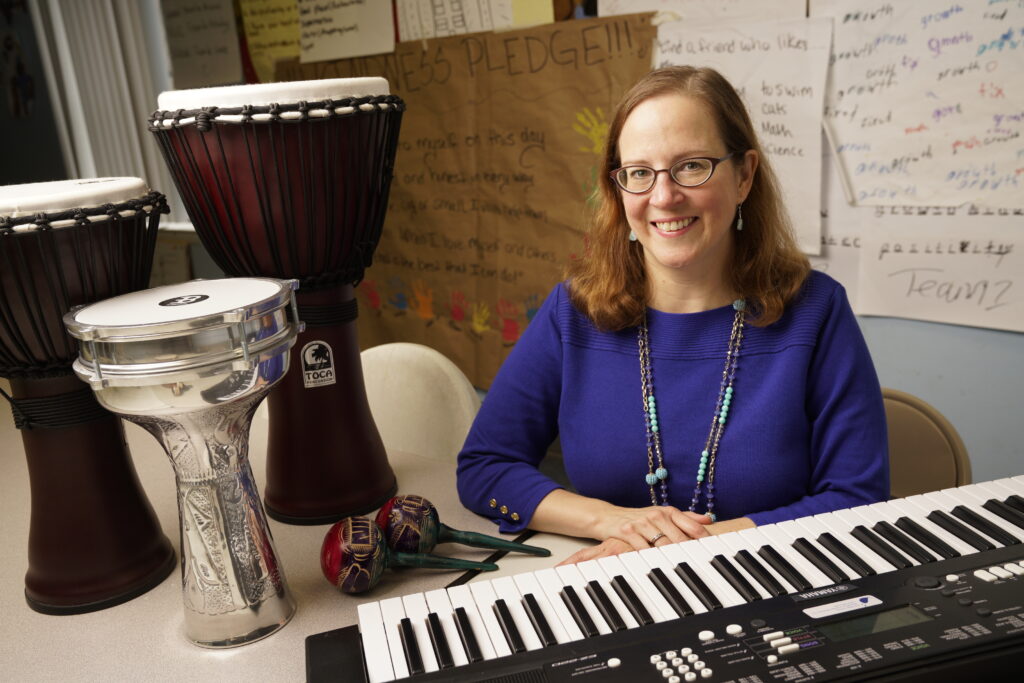
Imagine this scenario: a woman carrying hand drums, a keyboard, percussion instruments, and a small xylophone into a converted convent in an old church in Baltimore. It sounds like the opening to a joke. However, as much fun as Amy Tenney is going to have – and provide – her work is no joke.
Already earning her music therapy board certification with only a few classes left to finish her master’s degree in music therapy from Immaculata University, Tenney has dedicated her professional life to working with immigrants, refugees and those seeking asylum in the United States. Beginning her career as a lawyer, she began counseling immigrants on legal issues and became experienced in immigration law and policy. Taking those skills and her music therapy education, she recently received a fellowship grant through Open Society Institute in Baltimore to start a program called “Healing and Community Integration through Music: Refugees and other Vulnerable Immigrants Program.”
Understanding the incredible challenges that immigrants face – not the least of which may include a loss of identify and culture, Tenney began her fellowship last fall working in partnership with established organizations already helping refugees such as the Refugee Youth Project’s afterschool program for young refugee students. She continually seeks to provide music therapy services through additional partnerships to complement the resources that refugees are receiving. When she gathers a group in the old convent, school or local community center, she is cognizant of each participant’s needs and realizes that healing through music is just one component of their journey. According to Tenney, music can be used to relieve stress, improve mood, and teach skills – including language.
A typical “session” with the participants often leads to an improvisational musical experience that allows everyone freedom to express themselves. This forces Tenney to learn how to lead the improv and to observe non-verbal cues from any shy participants who may be overshadowed by others.
“It’s a humbling experience,” she asserts. “I am not going to be an expert on everything…like music from other countries.” She laughs while explaining that at first she was frustrated by the fact that she couldn’t understand the words to some of the songs that the participants sang. However, music can act as a unifying language which is exactly why she chose it for her grant proposal.
“Music isn’t very controversial,” she states. “It’s something that people understand at various levels.”
Spending ten weeks working with a group of adult asylum seekers, Tenney witnessed first-hand the unifying nature of music. The group shared their music and danced joyfully which led to support of one another. During the group sessions, Tenney facilitates various types of music therapy interventions with participants, such as improvisation on percussion instruments, learning American songs and adapting them with the participants’ own lyrics, relaxation and imagery experiences with music, and sharing songs with each other. At a recent session, participants communicated with each other in a unique way by taking turns rapping in their own languages. The music therapy sessions help participants to bond with others in a similar situation, find hope, communicate feelings verbally and non-verbally, reduce stress, and take pride in themselves and their own musical expressions.
One of the main benefits of the fellowship is having the ability to develop a structured program and offering it consistently – instead of just when Tenney has time. She works with various organizations and provides group sessions on a weekly basis or other schedule that is appropriate for the organization. She hopes to add individual and family sessions and eventually a refugee community choir.
The goals of the program include: 1) increasing opportunities for positive social interaction, thereby limiting isolation; 2) providing intentional opportunities for self-expression and choice; 3) increasing awareness of personal and community resources (aspects of resilience); 4) reducing anxiety, depression or other mental health concerns; and 5) reinforcing English skills. Additionally, Tenney envisions training other creative arts therapists and community members to work with refugees through this program to increase the likelihood of sustainability and expand impact.
Tenney took a grant writing course at Immaculata, taught by music therapy faculty member Dr. Andrea Hunt. The course helped Tenney write the proposal that eventually secured the fellowship grant. In addition, her final project for her master’s is a survey sent to professional music therapists inquiring if they work with refugees. With this information, she can create a baseline of knowledge that can help extend the program and may add to the existing literature for music therapists working with refugees and others.
“Amy has integrated her many skills from her previous career to become an advocate to bring music therapy to those persons who are underserved in the community,” states Lillian Eyre, Ph.D., MTA, MT-BC, associate professor of music therapy.
Tenney sums it up when she states that she wants the program to outlive the fellowship. “I want to take the program beyond Baltimore.”